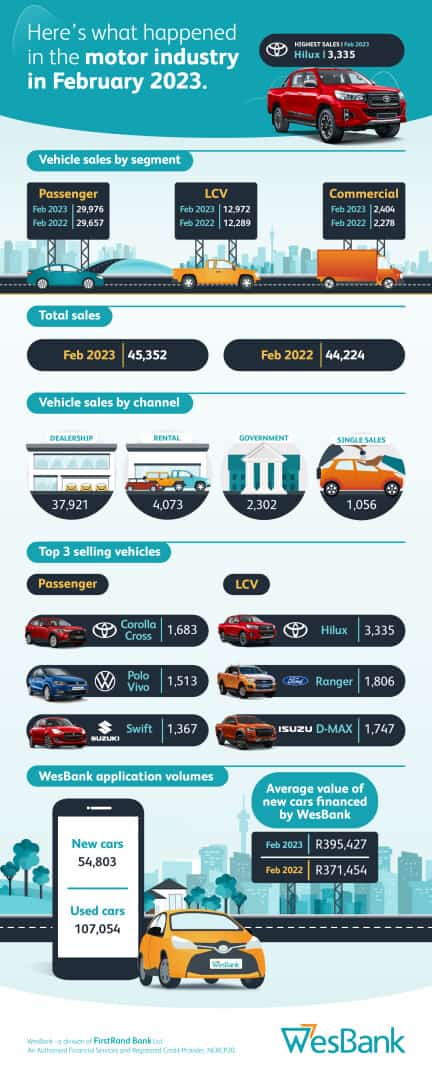“New vehicle sales growth should be in smaller increments during 2023 for no other reason than a relatively more stable sales year experienced during 2022,” says Lebogang Gaoaketse, Head of Marketing and Communications at WesBank. “This shouldn’t necessarily be construed as poorer performance from the market, but rather more realistic growth that can be expected as the market continues its recovery.”
The new vehicle market grew 13.9% year-on-year in 2022, but off the back of a volatile sales performance in 2021 as a result of the COVID-19 pandemic. As a result, the market is currently performing at levels last experienced during 2019, confirming the recovery of the market, rather than outright growth. “It is interesting to note that annual sales of 363,696 units in 2022 were just 2.3% up on 2019’s performance of 355,379 units,” said Gaoaketse.

“Not that this is a negative,” says Gaoaketse. “It remains positive for the market to have recovered volumes to this level, especially given the external constraints over the past few years. Demand remains good as measured by WesBank’s rate of applications, providing a solid foundation off which the market can continue its recovery.”
External factors continue to place pressure on new vehicle sales. Household budgets remain generally behind inflation; interest rates have increased eight times in the last 12 months; and fuel prices continue to climb. “This all provides many detractors for market growth,” says Gaoaketse.
“However, there are positive contributors that continue to drive the market’s recovery and growth in real terms,” continues Gaoaketse. “Not least of these is a massively improved supply chain that will organically meet levels of demand better with consequent increases in volumes.”
According to figures released by naamsa | the Automotive Business Council, February sales recorded 45,352 units, up 2.6% year-on-year.
Passenger car sales were behind the market performance, increasing 1.1% to 29,976 compared to February last year. The segment was salvaged by the rental market that, although 11.8% down in February 2022, pushed the sector into positivity territory thanks to 3,654 units. Showroom activity was aligned to the overall market, up 1.1% year-on-year in the dealer channel.
Recent new product introductions in the Light Commercial Vehicle (LCV) segment should boost volumes over the coming months. LCVs recorded 12,972 units during February, representing an increase of 5.6% year-on-year.
“The country’s energy crisis will invariably impact new vehicle sales off the back of declining consumer and business sentiment,” concludes Gaoaketse. “However, the market’s resilience shown over the past three years proves how robust the industry remains; and that there continues to be opportunity for growth.”
Content and images supplied via MotorPress
